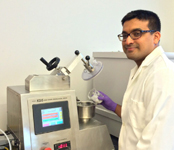
Imagine sitting at your kitchen table eating your now soggy bowl of cereal as you do every morning. As the caffeine from your morning java starts to awaken your sleep addled brain, you wonder, “If we can send humans rocketing around the Earth, why can’t someone figure out how to keep my Corn Cracklin’ Toasty Puffs crisp for 10 minutes while I eat them?” Suddenly, your eyes pop open. You know the answer! You are excited by the prospect of a lifetime filled with crunchy breakfast cereal until you realize that, like many great ideas, this one will remain in your kitchen because you have no idea how to get the idea from your brain to someone who can actually make your dream a reality.
Believe it or not, solving your breakfast conundrum of “Maintaining Crunchy in a Moist Environment” is one of the many challenges posed on the innocentive.com website. InnoCentive is essentially a crowd-funded site where solution seekers – companies, organizations, and individuals – post a challenge and allow “solvers” to offer their fixes, typically in exchange for a cash prize.
Saurabh Sarkar, a pharmaceutics graduate student studying with Dr. Bodhi Chaudhuri, recently garnered a $5000 InnoCentive prize for his solution to, “A Sticky Problem – Modeling Tablet Stickiness,” presented by AstraZeneca. “The seekers (AstraZeneca) wanted to know more about the sticking of powders because during the tableting process, powders can stick to the manufacturing equipment. This can cause non-uniformity of the drug doses and lead to batch rejection and commercial losses,” said Sarkar.
While this is the first time that Sarkar has submitted a solution, he is a regular visitor to the site. “I have known about this site for a while now. Dr. Dipak Majumdar told me about it while I was doing undergraduate work at the University of New Delhi. He urged us to look at the site so we could understand the problems of the day and where we stand in terms of solving them.”
Sarkar knows he solved a problem for a corporation that likely will implement it in the manufacturing process making his solution far more valuable than his $5000 prize. He is, however, more concerned about the challenge itself rather than the monetary gain his solution provided. “It is immensely satisfying when my knowledge can offer a solution. A lot of problems are multidisciplinary in nature, so presenting a good solution often involved both breadth and depth of scientific understanding. It is a good challenge to your abilities.”
Problem solving is in Sarkar’s nature. He worked on several projects in Chaudhuri’s lab, many dealing with industrial problems including pharmaceutical processing for solid oral and respiratory dosage forms and is close to defending his Ph.D. thesis work. Chaudhuri, a chemical engineer by training, encourages his students to look for these types of solutions to problems. He, and a small group of other engineers and scientists, developed a novel mixing machine to mix drug product more thoroughly thus increasing product uniformity and decreasing costs.
Chaudhuri’s students regularly garner national awards and Sarkar is no exception. In addition to the Herzog Fellowship from UConn, he recently received the NERDG Academic Research Award from the American Association of Pharmaceutical Scientists. He also has a number of poster presentations to his credit. Among his accolades, Sarkar’s favorite might be the National Children Scientists Award he received in high school for his work on a suspension culture that increased the yield of a costly plant chemical without cutting the tree. “I met the Indian president, Dr. APJ Abdul Kalam, an eminent scientist, and it was a mind boggling experience. It still motivates me to do good research.” Sarkar also takes pride in motivating others to do good research and teaching students. He has mentored over 20 students, and that, he says, “has been a wonderful experience.”
While exceptionally focused, Sarkar doesn’t spend all of his days in the lab contemplating how to solve the world’s problems. He is a self-described “food junkie” and an avid traveler, having visited 30 states. He likes history and reading, and even wrote a blog at one point. He loves sports, especially cricket. He laughs, “I had ACL surgery and was playing a month later which was not appreciated by Dr. Chaudhuri!”
Still, every morning while the world is eating its soggy cereal, Sarkar’s mind is engaged. “I have always looked for real life problems to solve. I hope this award inspires other students at UConn and outside to look for challenges so that they can contribute; and simultaneously assess and hone their skills.”



